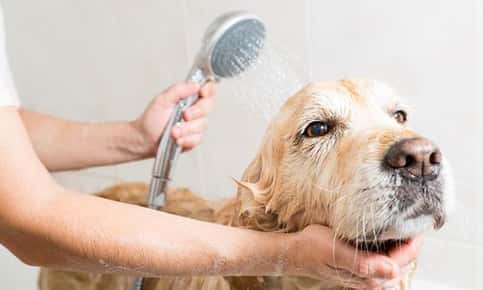
How Often Should I Groom and Bathe My Dog?
If bathing your dog leaves you wetter than your pet, you may be wondering just how often you really need to wash your pet. Although most dogs don't require daily baths, washing them periodically improves their appearance, reduces odors, and helps keep their skin healthy.
When to Bathe Your Furry Friend
Dogs only need to be bathed every four to eight weeks, but the optimal time between baths varies depending on your pet's breed and coat type. If you notice your pet's coat is naturally a little oily, monthly baths may be ideal. (If your pet's coat isn't normally oily, ask your veterinarian if a skin condition could be the cause.)
Dogs that have double or water-repellant coats, like Australian Shepherds, Siberian Huskies, Akitas, Labrador Retrievers, and Newfoundlands, may only need baths every few months. Bathing them more often than necessary can cause dry skin. Short-haired dogs may also require less frequent bathing, as dirt usually doesn't become trapped in their fur and can be easily removed during grooming sessions.
Hairless dogs should be bathed more often than other breeds. In fact, weekly bathing may be needed to protect your Chinese Crested or American Hairless Terrier's skin. Lack of hair can increase the risk of dry skin and skin infections in these dogs. Regular bathing with a moisturizing shampoo removes dirt, debris, and bacteria while also reducing dryness.
Regardless of the coat type, your dog may need to be bathed more frequently if it enjoys rolling around in the mud, inspecting the neighbor's garbage or swimming in the ocean or a lake. If your pet is just a little dirty, you may be able to remove much of the dirt with a wet washcloth.
6 Dog Bathing Tips
Does your dog dread bath time? These tips may make the process a little easier:
- Don't Overfill the Bathtub. You may enjoy immersing yourself completely when you take a bath, but your dog probably doesn't share your feelings. Three or four inches of water are ideal for medium or small dogs, but you'll only need an inch or two for small dogs. Dogs generally find lukewarm water most comfortable.
- Brush Your Dog First. Brushing helps remove dirt and prevent mats. if you don't brush your dog first, you may spend more time than expected detangling your pet's wet fur.
- Be Prepared. Collect the supplies you need before you start the bath. Constant interruptions only prolong the process and can stress dogs that don't particularly enjoy baths.
- Provide Sure Footing. Sliding on the slippery tub floor may make bathtime unpleasant for your dog. Before you fill the bathtub, put a non-slip rubber mat or a towel on the bottom of the tub.
- Don't Share Shampoo. Your shampoo is too acidic for your pet's skin and contains fragrances your dog may find unappealing or irritating. Using human shampoo may dry your pet's skin and increase the risk of developing a skin infection. Fortunately, you'll find a selection of dog-safe shampoos online, at your veterinarian's office or at pet supply stores.
- Make an Appointment with a Professional. If bathing is an unpleasant experience for you and your dog, consider scheduling a grooming appointment for your pet.
Grooming Helps Keep Your Dog Clean Between Baths
Brushing your dog daily, or at least every few days helps keep mats and clumps to a minimum, removes dirt and loose hair, and distributes skin oils that keep the coat glossy and healthy.
Grooming sessions also provide the perfect opportunity to spot flea infestations. Although fleas may be too small to see, you may notice a few signs that your pet is infested, such as reddened skin, tiny red bites, hair loss or a collection of brown or red flea "dirt" on the base of the tail, abdomen, neck or ears.
While you brush your pet, look for rashes, hot spots, lumps, and bald spots. Call your pet's veterinarian for advice if you notice any of these symptoms. Thanks to regular grooming sessions, you may discover potential health issues before they can make your pet too uncomfortable.
Regular brushing and bathing help your pet stay healthy and well-groomed. Not sure how often to bathe or groom your dog? Give us a call. We're here to help you care for your pet, whether you have concerns about grooming or health issues. Contact our office to schedule your appointment.
Sources:
PetMD: Pet Health: Why Bathing and Brushing Are Important
https://pets.webmd.com/features/pets-bathe-groom-important#1
American Kennel Club: How Often Should You Bathe Your Dog? Groomers Weigh In
Dogtime: Dogs 101: Everything You Should Know About Bathing Your Dog

